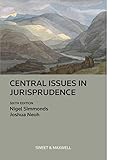Central Issues in Jurisprudence: Justice, Law and Rights / by Nigel Simmonds and Joshua Neoh
Material type: TextPublication details: London: Thomson Reuters, 2022.Edition: 6th edDescription: 359p.; 21cmISBN:
TextPublication details: London: Thomson Reuters, 2022.Edition: 6th edDescription: 359p.; 21cmISBN: - 9780414104129
- 340.1 SIM
| Item type | Current library | Call number | Status | Date due | Barcode | |
|---|---|---|---|---|---|---|
 Books
Books
|
Central Library | 340.1 SIM (Browse shelf(Opens below)) | Available | 000764 |
Introduction
Doctrine and Theory
The Centrality of Jurisprudence
Introduction to Part 1: Justice
Subjectivism
Other Options
Neutrality
1. Utilitarianism
Why Be a Utilitarian?
Liberalism, Utility and Moral Neutrality
Uncertainty
Consequences
Utility and Distribution
Act and Rule Utilitarianism
Rule Utilitarianism as a Jurisprudential Theory
Liberalism and Preferences
Rights and Utility
Selected reading
2. Rawls
Introduction
Reflective Equilibrium
The Original Position
The Basic Structure
Do we need a Theory of Justice for the Basic Structure
Criticism of Utilitarianism
The Thin Theory of the Good
Two Principles
The Difference Principle
Choosing the Difference Principle
Greater Equality?
The First Principle of Justice
Political Liberalism
Justice in the Family
Selected reading
3. Nozick
An Arbitrary Starting Point?
Comparison with Rawls
Principles of Acquisition
Pale Self-Ownership
Patterned Distribution and Historical Entitlement
Markets and Equality
Giving Content to Rights
Selected reading
4. Finnis on Objective Goods
Goods and Desires
Objective Goods
Goods and Human Nature
Prudence and Morality
Incommensurability of Goods
The Common Good
The Role of Choice
Justice
Basic Rights
Law
Aristotelianism: Basic Goods versus Capabilities
Selected reading
Introduction to Part 2: Law
Natural Law and Legal Positivism
5. Hart
Legal Positivism
What Positivists Do and Do Not Claim
Normativity and Reductionism
Rules and the Internal Point of View
Powers and Secondary Rules
The Legal System
Adjudication
Distinguishing Cases
Legal Obligation and the Internal Point of View
A Different Positivism?
Rules and Formal Justice
The Minimum Content of Natural Law
The Nature of Conceptual Analysis
Hart’s Theory as Political Philosophy
Legal Doctrine and Legal Theory
Selected reading
6. Dworkin
Rules and Principles
Principles and Positivism
Discretion and Rights
The Rule of Recognition and the Soundest Theory
Constructive Interpretation
Semantic Theories
Some Scepticisms
The ‘‘Threshold Objection’’
Choosing a Legal Theory
Law as Integrity
Order, Theory and Community
Selected reading
7. Fuller
The Story of Rex
Facts, Values and Purposes
Conceptual Structure
Moral Purposes
Wicked Regimes
The Value of the Rule of Law
Wicked Legal Regime: Slavery
Guidance by Rule and by Aspiration
Principle and Change
Selected reading
Part 3: Rights
8. The Analysis of Rights
Some Fundamental Ideas
Legal and Moral Rights
Hard Atoms and Soft Molecules
Rights as Complex and Peremptory
A Slight Digression
Hohfeld’s Analysis
Kantian and Hohfeldian Rights Compared
Internal Complexity Restored?
Is the Absence of a Duty a Right?
Internal Complexity Without Peremptory Force?
Rights Against Nobody?
Rights Against Specific Persons
Levels of Abstraction
Peremptory Force: Exclusionary or Conclusory?
Exclusion upon Exclusion
One Set of Reasons; Two Perspectives
Exclusion Abandoned
The “Will” and “Interest” Theories
MacCormick’s Criticisms
Selected reading
Index
Central Issues in Jurisprudence offers a clear introduction to the main theories which dominate contemporary jurisprudence. The exposition highlights the broad philosophical questions that lie at the heart of the subject, and reveals some of the diverse perspectives that might be adopted in addressing those questions. The object is not merely to inform but to enable the student to think critically and independently. (Source: https://www.vitalsource.com/products/central-issues-in-jurisprudence-nigel-simmonds-joshua-neoh-v9780414104150?term=9780414104129)
There are no comments on this title.

